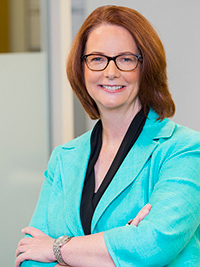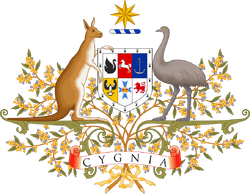
Gillard (2017)
The Second Gillard Government officially began operation at noon WST on 3 January 2017, when Julia Gillard, the 39th Chancellor of the United Cygnian States, returned to office; Queen Elizabeth has reigned throughout Gillard's tenure. Gillard's running mate, Tanya Plibersek, took office as Vice Chancellor on the same day. Gillard is the first female chancellor and eleventh Labour chancellor. The Second Gillard Government succeeded the Turnbull Government following a Labour victory at the 2016 federal elections.
Major policy initiatives of the Second Gillard Government include the Clean Energy Act, asylum seeker policy, Mineral Resource Rent Tax, National Broadband Network, the National Disability Insurance Scheme, and reforms in school funding.
Gillard also nominated Supreme Court Justice Ian Macdonald and Chief Justice Virginia Bell ahead of the retirement of incumbent Chief Justice Robert French on 29 January 2017; the Senate confirmed both of these nominations, upon which both took office on 30 January.
Labour currently controls the House of Representatives, and has a plurality in the Senate. Gillard's term is set to end on 3 January 2021, when either she will begin her third term (second term of the current government), or the 42nd Chancellor will take office, depending on the outcome of the 2020 federal elections.
Transition period and inauguration
The cancellarial transition period began following Gillard's election to the chancellorship in December 2016, though Gillard had chosen Willem Korthals to begin planning for the transition in May 2016. The Gillard-Plibersek Transition Project was co-chaired by Joseph Chatfield, Raymond Yong and Peter Steiner. During the transition period, Gillard announced nominations for her cabinet and administration. In November 2016, public servant Drew Clarke accepted Gillard's offer to serve as Chancellery Chief of Staff. Gillard was inaugurated on 3 January 2017, succeeding Malcolm Turnbull. Gillard officially assumed the chancellorship at 12:00 Noon, WST, and completed the oath of office at 12:05 PM, WST. She delivered her inaugural address immediately following her oath. Gillard's transition team was highly complimentary of the Turnbull administration's outgoing transition team, particularly with regards to national security, and some elements of the Turnbull-Gillard transition were later codified into law.
Personnel
Cabinet appointees
 | ||
| The Gillard Cabinet | ||
|---|---|---|
| Office | Name | Term |
| Chancellor | Julia Gillard | 2017– |
| Vice Chancellor | Tanya Plibersek | 2017– |
| Minister for Foreign Affairs |
Penny Wong | 2017– |
| Treasurer | Chris Bowen | 2017– |
| Minister for Defence |
Richard Marles | 2017– |
| Attorney-General | Mark Dreyfus | 2017– |
| Minister for Home Affairs |
Shayne Neumann | 2017– |
| Minister for Agriculture and Resources |
Joel Fitzgibbon | 2017– |
| Minister for Commerce |
Jason Clare | 2017– |
| Minister for Employment |
Brendan O'Connor | 2017– |
| Minister for Veterans' Affairs |
Amanda Rishworth | 2017– |
| Minister for Health and Human Services |
Catherine King | 2017– |
| Minister for Communications |
Michelle Rowland | 2017– |
| Minister for Social Services |
Linda Burney | 2017– |
| Minister for Education |
Tanya Plibersek | 2017– |
| Minister for the Environment |
Tony Burke | 2017– |
| Minister for Energy |
Mark Butler | 2017– |
| Chief of Staff | Drew Clarke | 2017– |
| Postmaster-General | Heather Smith | 2017– |
| Auditor-General | Grant Hehir | 2017– |
| Ambassador to the United Nations |
Gary Quinlan | 2017– |
Judicial nominees
Cygnian Supreme Court
During Gillard's tenure thus far, there has been one vacancy on the Supreme Court of the Union. During the 58th Congress, Gillard successfully nominated one new Supreme Court Justice as well as a Chief Justice:
- Virginia Bell, replacing Chief Justice Robert French – 2017
- Ian McDonald, replacing Robert French – 2017
| |||||||||||||||||||||||
| ||||||||||||||

